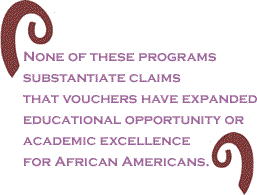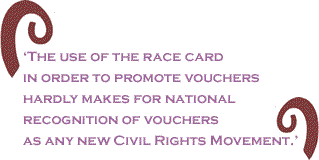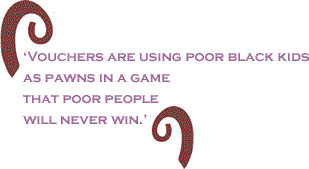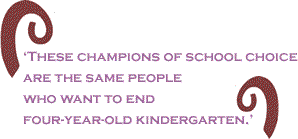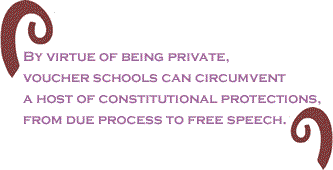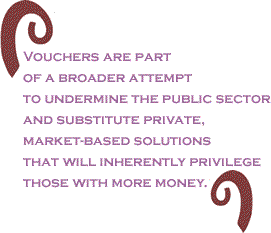
|
|||||||||||||||||||||
|
This article originally appeared in the Spring Issue of Rethinking Schools. Almost 45 years ago, Charles McDew helped found the Student Nonviolent Coordinating Committee (SNCC), an organization that left its mark on history for its efforts to desegregate public facilities and register black voters in the South. McDew, SNCC’s chair from 1961 to 1964, remembers all too well the heart-rending moments of the Civil Rights Movement – such as in 1964 when he watched federal authorities pull the bodies of murdered black men and boys from the bottom of the Natchez River in Mississippi. His experience leaves him with little patience for claims that taxpayer-funded vouchers for private schools are a new Civil Rights Movement. “It’s absolute nonsense,” he says. Rev. Graylan Hagler, who was active in the desegregation struggles in Boston and is currently president of Ministers for Racial, Social, and Economic Justice, understands the Northern variations of racism. He too is dismayed at claims that vouchers will advance the civil rights of African Americans. “The [civil rights] battle has always been around public schools, not around private academies,” he says. Following desegregation initiatives in major cities, Hagler explains, “you saw an immediate drain of white participation from public education, going into parochial and private schools. And ever since, they have attempted to redirect public dollars out of public education and into private schools.”
Eleanor Holmes Norton, Washington, D.C.’s non-voting delegate to the House and a long-time civil rights and feminist leader who was the first woman to chair the Equal Employment Opportunity Commission, responds with outrage at the suggestion that vouchers are a civil rights struggle. “In this age of advertising, everybody appropriates the language of the best and most universal themes,” she says. “The use of the race card in order to promote vouchers hardly makes for national recognition of vouchers as any new Civil Rights Movement.” Norton is particularly galled by Republican Party tactics during the congressional debate last fall over a federal voucher program in Washington, D.C. In the House, for example, the voucher measure passed 209-208 because Republicans held the vote after anti-voucher legislators such as Rep. Dennis Kucinich (D-Ohio), Rep. Richard Gephardt (D-Mo.), and Rep. Elijah Cummings (D-Md.) left to attend a presidential candidates’ debate sponsored by the Congressional Black Caucus. (Cummings is head of the Black Caucus; 38 of its 39 members oppose the D.C. voucher program.) Invoking Civil Rights Voucher supporters often say they are merely providing educational options for low-income blacks and Latinos, particularly in urban districts where the crisis in education is most acute. The rhetoric serves a dual purpose. First, it obfuscates the true goals of the key financial and political leaders of the voucher movement - universal vouchers and the subsequent gutting of public education. Second, it furthers the Republican strategy of driving a wedge between people of color and the Democratic Party, which by and large has argued that taxpayer dollars should go into public education and not be diverted into private schools.
African-American voucher supporters often invoke the language and imagery of the Civil Rights Movement. As Fuller said in a keynote address at a BAEO conference in Milwaukee in 2001, “Did we sit down at a lunch counter at Woolworth’s in Greensboro, N.C., February 1, 1960, to arrive at another lunch counter today where we are welcome but we can’t read the menu?” Schmoke, in a speech before the conservative Manhattan Institute several years ago, called vouchers “part of an emerging new civil rights battle for the millennium.” Flake, in a 1998 interview with the School Reform News, argued that vouchers are an extension of the struggle that began with the Brown decision. He went so far as to say that “public education is not a civil right. What is a civil right is equal access to a quality education for all, which was affirmed by Brown v. Board of Education in 1954.”
Roger Wilkins – whose many credentials include professor of history at George Mason University, publisher of the NAACP’s journal Crisis, former Washington Post journalist, assistant attorney general during the Johnson administration, and former member of the Board of Education in Washington, D.C. – says the fact that some African Americans support vouchers doesn’t sway him. “I think Fuller is wrong, and Floyd Flake is wrong,” Wilkins says without equivocation. “Black people aren’t monolithic. You asked me what I think. I think vouchers . . . are dead wrong and destructive. Fundamentally, vouchers are using poor black kids as pawns in a game that poor people will never win.” While disappointed in African-American supporters of vouchers, Wilkins focuses his ire on businessmen such as John Walton, the Wal-Mart heir who is a prime financier of voucher initiatives. Such wealthy conservatives, Wilkins says, “are almost theologically committed to privatizing almost everything. They just don’t like public enterprise, or a public effort, except the U.S. Army.” Wilkins also notes the irony that while one of the main emphases of the Civil Rights Movement was economic justice, wealthy backers of vouchers are “exactly the people who bash the teachers’ unions and are basically hostile to any workers’ movements, wherever they are.” During the recent battle over vouchers in Washington, D.C., supporters took their argument a step further. They not only portrayed vouchers as a civil rights issue but compared opponents of vouchers to die-hard racist segregationists. One advertisement by a pro-voucher group, for example, noted that “40 years ago politicians like George Wallace stood in the doors of good schools trying to prevent poor black children from getting in.” Another targeted long-time supporter of civil rights Sen. Edward Kennedy (D-Mass.), comparing him to segregationist Eugene “Bull” Connor, who used police dogs to attack civil rights demonstrators in Birmingham in the 1960s. One of the groups behind the ads, D.C. Parents for School Choice, admits that it has received funding from conservative groups such as the Bradley Foundation and the Walton Family Foundation. The group declined to say who financed the ads this fall, saying only it was “private donors.” The voucher movement has shown a willingness to use whatever rhetoric it finds useful. Looking beyond rhetoric, however, the analogy between vouchers and the Civil Rights Movement fails on two basic levels: the reality of existing voucher programs and the contrasting ideology and goals of the voucher movement when compared to the Civil Rights Movement. Voucher Realities
The link between vouchers and civil rights is more an assertion than a sustained argument. In essence, supporters argue that vouchers increase African Americans’ access to educational opportunity and academic excellence and therefore are an extension of the Civil Rights Movement. There are three existing voucher programs in the country – citywide programs in Milwaukee and Cleveland that target low-income students and a statewide program in Florida. But none of these programs substantiate claims that vouchers have expanded educational opportunity or academic excellence for African Americans. In Milwaukee, the nation’s voucher laboratory, the state is not currently collecting academic information from voucher schools. Church/state considerations make it all but impossible to demand the same accountability from private schools as public schools. Recent headlines have focused on problems in the voucher schools. One school, founded and run by a convicted rapist, has faced several evictions and has not regularly paid its staff. Another school reportedly did not even have books for the students and improperly received $330,000 from the state for children who never attended the school. At the same time its founder bought two Mercedez Benz cars. A Milwaukee judge has since ordered the school closed, and the children were relocated. The monthly Community Brain-storming forum is the black community’s main political venue for discussion in Milwaukee. At last November’s forum, Larry Harwell, who worked with Rep. Polly Williams (D-Milwaukee) in 1990 to set up what was then a very limited voucher program, sharply criticized the direction the voucher program had taken and argued that the black community’s main focus should not be on vouchers but on improving the Milwaukee Public Schools. “The choice [voucher] schools need to be changed,” he said. “Some of these schools are terrible.” The November forum included the city’s African-American legislators in the state Assembly and Senate. All criticized ongoing attempts by Republicans to expand the voucher program beyond low-income families attending schools in Milwaukee. They were especially critical of the hypocrisy of pro-voucher suburban Republican legislators pushing expansion. “These champions of school choice are the same people who want to end four-year-old kindergarten,” Sen. Gwen Moore (D-Milwaukee) noted. “You have to wonder what the ultimate objective is for those [suburban legislators] who say the only thing that is important is school choice.” While the Milwaukee voucher program has increased the number of African Americans in private schools, whites still remain a majority in the private schools. (Whites account for about 15 percent of Milwaukee’s public school enrollment.) In addition, voucher schools are even more segregated than public schools, according to data from the Public Policy Forum in Milwaukee. More than half the 107 voucher schools in 2002-03 were at least 90 percent non-white, and almost a third enrolled only non-white students. At the same time, five voucher schools enrolled more than 90 percent white students. In Cleveland, meanwhile, vouchers disproportionately benefit white students, according to a study of the program released in December. While African Americans represent 71 percent of students in the public schools, they account for only 52 percent of voucher students. Whites represent just 20 percent of public school students but 34 percent of voucher students. The study, conducted by the Indiana University School of Education, also found that over four years there were no “statistically significant” differences in the academic achievement of voucher students compared to students in the public schools. In Florida, the state’s various voucher programs (which include vouchers for students from “failing schools,” tax credits for corporate-sponsored scholarships to private schools, and vouchers for students with special needs) have been plagued by mismanagement, lack of accounting for funds, and allegations of corruption. As the Palm Beach Post wrote in an editorial December 22, “Apparently, the chewing gum is too soft to stick, the baling wire is too flimsy to hold, and nobody can find the duct tape. Education Commissioner Jim Horne is having no luck with on-the-fly fixes to Florida’s school voucher programs.” In all three instances – Milwaukee, Cleveland, and Florida – vouchers
were promised as a sure-fire reform on the Clearly, the “vouchers as civil rights” rhetoric is at odds with the reality of existing voucher programs. The rhetoric also falls apart when one looks at the oft-stated goal of the movement’s key financial, ideological, and political backers – providing universal vouchers to all students. A universal voucher system has nothing to do with improving opportunity for low-income students. It would merely be a subsidy for more affluent families to help pay private school tuition, and it would exacerbate the neglect of the public schools that would still be educating the overwhelming majority of low-income students. Given the current politics and rhetoric surrounding vouchers, most programs are targeted rather than universal – a “softening-up” strategy, as it were. As a 1998 analysis for the Milton and Rose D. Friedman Foundation stated, vouchers for low-income families are merely a “beachhead” in “the long march to universal school choice.” Vouchers Roll Back Gains Vouchers do more than undermine the viability of public education, however. They also undermine hard-won civil rights gains. Ever since the Brown decision, various popular movements have upheld a vision of public schools as essential to democracy and have demanded legal protections for those previously marginalized – from Title IX prohibitions against gender-based discrimination, to the right to a bilingual education, to the inclusion of students with disabilities in public school classrooms, to the demand that public schools respect the rights of gay and lesbian students. Vouchers set back all these advances. Advocates for students with special needs are particularly concerned that vouchers provide a way to circumvent requirements that all students – regardless of their physical, emotional, or mental circumstances – receive a free and appropriate public education. The reason is that voucher schools, by virtue of being considered “private” even though they receive public dollars, do not have to provide the same level of special education services as public schools nor adhere to the requirements of the federal Individuals with Disabilities Education Act. The situation is similar for bilingual students. Gabriela Lemus is director of policy for the League of United Latin American Citizens (LULAC), the country’s oldest and largest Latino civil rights organization, with 100,000 members in almost 40 states and Puerto Rico. Lemus argues that vouchers “are a violation of the Civil Rights Movement.” One of the reasons, she says, is that “private schools don’t have to be sensitive to the rights of those with limited English proficiency, or provide English-as-a-second-language classes.”
Vouchers are also a threat to the civil rights of gay and lesbian students. In Milwaukee, for example, voucher schools do not have to adhere to a state law that prohibits discrimination in public schools on the basis of sexual orientation. And throughout the country, many religious schools are teaching that homosexuality is a “sin.” Equally important, students that attend voucher schools are not guaranteed their constitutional rights. By virtue of being private, voucher schools can circumvent a host of constitutional protections, from due process to free speech. In a well-publicized case in 1995, a federal judge in Milwaukee threw out a free speech claim by an African-American student at the private University School who was suspended and asked not to return the following fall because, during a presentation in her English class, she had criticized the school for being “racist.” In his opinion, Federal Judge Terence Evans wrote that it “is an elementary principle of constitutional law that the protections afforded by the Bill of Rights do not apply to private actors such as the University School. Generally, restrictions on constitutional rights that would be protected at a public high school . . . need not be honored at a private high school.” Voucher History It’s not surprising that there is a gaping contradiction between the goals of the voucher movement and the educational aspirations of African Americans. The voucher movement traces directly back to the work of economist Milton Friedman, who is perhaps most infamous for his free-market blueprints in the 1970s and 1980s for the Chilean dictatorship of Augusto Pinochet. Ever since the 1950s, Friedman has advocated for universal vouchers. The focus of education reform in the 1950s, however, was on providing opportunity and equality within the public schools, and Friedman’s ideas never won much popular support. There was one group, however, which took up Friedman’s voucher plan. The first publicly funded school vouchers in the United States were established in Virginia. Their purpose was to circumvent the Brown decision and to help white people attend private academies so they wouldn’t have to go to public schools with blacks. The Virginia vouchers and other “freedom of choice” plans passed by Southern legislatures expressly sought to maintain segregated school systems. McDew, the SNCC activist, has painful memories of segregated schooling in the South, in particular the white “Christian academies.” Under a voucher program, such academies would be able to receive public dollars and would bolster attempts to further resegregate schools. “When I think of vouchers,” McDew says, “I think mostly of what it is going to do in the South. And that is, it’s going to totally, totally resegregate the schools.” The voucher laws in the South were eventually ruled unconstitutional. But following the rightward drift of national politics in recent decades and the growing influence of marketplace ideology, vouchers were given new life in the 1980s and 1990s. Tammy Johnson, a 34-year-old organizer with Expose Racism and Advance School Excellence (ERASE), a national initiative based in the Bay Area, says it’s impossible to overestimate the effect of the right wing’s 25 years of relentlessly pushing marketplace ideology and the view that public government services are part of the problem, not the solution.
Johnson says the younger generation of blacks and Latinos doesn’t have the same emotional or ideological attachment to the Civil Rights Movement. “You are dealing with generations that grew up with [Ronald] Reagan,” she says. “They can’t even envision what a civil rights victory is. And the voucher folks are taking advantage of that.” Bill Fletcher Jr., president of TransAfrica Forum in Washington, D.C., and a long-time union and anti-racist activist, argues that vouchers are part of a broader attempt to undermine the public sector and substitute private, market-based solutions that will inherently privilege those with more money. “Vouchers are disingenuous, and I say disingenuous because some of these people should know better,” Fletcher says. “There are no examples of where the free market has addressed basic social questions like public education or public transportation.” Part of what makes it difficult to untangle the “vouchers as civil rights” rhetoric is that conservatives mask their attacks on the public sector in populist rhetoric. They also consciously link “individual rights” to “civil rights,” thus obscuring that the Civil Rights Movement was a broad-based, multi-issue social movement demanding that the government follow through on its responsibility to protect the rights of all. In contrast, conservatives articulate a narrow, hyper-individualistic conception of equality based on the right to be free, as the conservative Center for Individual Rights puts it, from “a meddlesome, interest-group-infested government.” Supreme Court Decisions It is enlightening to look at differences in two decisive Supreme Court decisions involving education – the 1954 Brown decision and the 2002 Zelman decision, which upheld the constitutionality of publicly funded vouchers to private religious schools. The unanimous Brown decision struck a blow not only for educational equality but also slashed at the entire Jim Crow structure of “separate but equal.” While historians differ about the specific influence of Brown, there is little doubt it emerged from a larger struggle against racism and is part of a Civil Rights Movement that targeted not only school segregation but other edifices of white supremacy such as the denial of the right to vote and blatant discrimination in housing and jobs. But the 5-4 Supreme Court decision that upheld vouchers revolves around the separation of church and state. Nothing in the decision limits vouchers to low-income students or links the legal issues involved to the struggle against racism and for equal opportunity. Interestingly, in the Brown decision Chief Justice Earl Warren wrote that education “is perhaps the most important function of state and local governments.” Vouchers, however, negate that function and view education as little more than an issue of consumer choice. At heart, the Civil Rights Movement was about expanding the government’s democratic commitment to protecting the rights of all. Vouchers are about getting the government to walk away from that responsibility and leaving everything to individual, private-sector solutions. Wilkins says, “Vouchers give people this illusory sense that somebody is trying to do something for poor black kids. If they really cared about poor black kids, they would roll up their sleeves and help us fix our public schools.” Barbara Miner ([email protected]) is the former managing editor of Rethinking Schools. |
May
6 2004 |
|||||||||
|
|||||||||
|
|
|||||||||
| Printer Friendly Version | |||||||||
 |
|||||||||
| |
|||||||||
| |
|||||||||






















